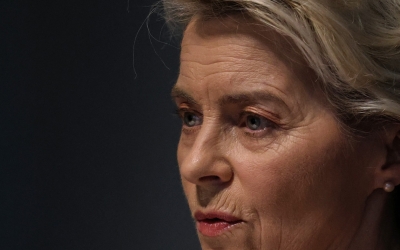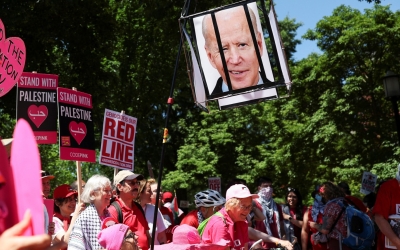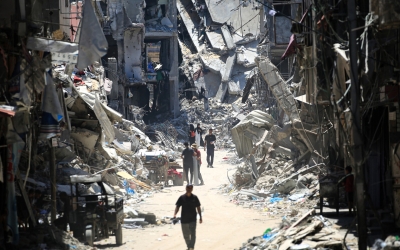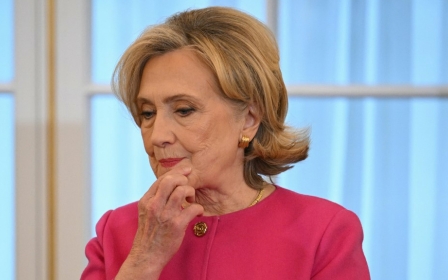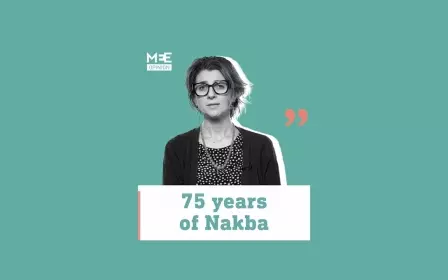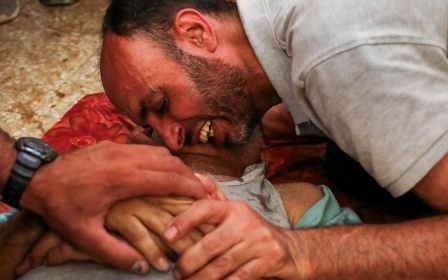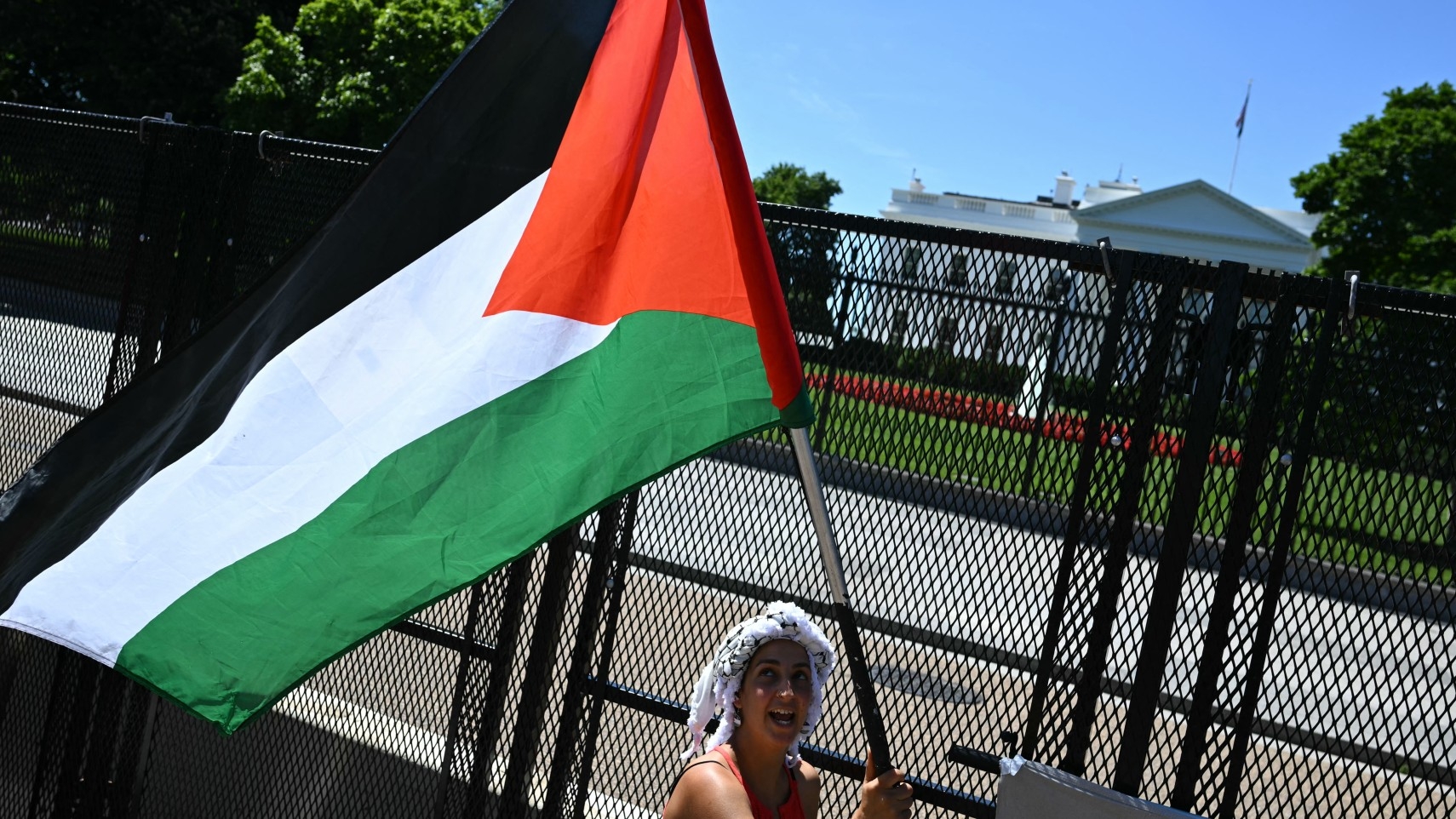
War on Gaza: Without Palestinian self-determination, Arabs will never legitimise Israel
The emergence of the US as the global superpower, following the collapse of the Soviet Union in 1991, has shifted the universal power dynamic, with a number of consequences that persist today, including regional conflicts, instabilities, and what some perceive as a new form of imperialism.
Critics argue that the longstanding basic cornerstones of US policy in the Middle East have remained largely unchanged since the Truman era, since they are implemented to justify America's imperialistic goals as well as to maintain its hegemony over certain parts of the world.
These cornerstones include containment of communism and the post-Soviet focus on countering "Islamic fundamentalism", market or military control over oil resources in the Arab world, support for proxy regimes such as Israel, and suppression of liberation movements in the region. This continuity persists regardless of which party holds power, leading some to perceive little substantive difference between Democratic and Republican administrations in this regard.
It's frustrating that despite positioning itself as the gavel holder of the peace process in the Palestinian-Israeli conflict for the last three decades, the United States has faltered, resorting more to crisis management than conflict resolution. Presently, it's evident that the US has failed dismally in its role as an honest broker for peace, as it has disproportionately supported Israel, the dominant party, over Palestine, the marginalised counterpart.
The conflict is often a focal point of regional tensions. It's important to note that it predates specific dates, such as 7 October 2023. The events on that date may trigger reactions, but the root causes of the conflict lie in deeper historical and political dynamics. For people who have endured decades of occupation, such actions may be perceived as natural responses to their circumstances.
New MEE newsletter: Jerusalem Dispatch
Sign up to get the latest insights and analysis on Israel-Palestine, alongside Turkey Unpacked and other MEE newsletters
On 8 October 2023, Palestinians faced attacks that labelled them as terrorists, disregarding their humanity and decades-long suffering under occupation. As the conflict escalated, particularly in Gaza, global awareness grew regarding the disproportionate response to events preceding 7 October 2023, prompting a critical examination of the justification for actions spanning the past 76 years.
This scrutiny challenged the international community to reassess its stance. Over time, there was a noticeable shift towards greater sympathy and empathy for the Palestinian plight, facilitated by widespread coverage on social media and mainstream news outlets, which shed light on the harsh realities of occupation and its enduring impact over generations.
It's truly ironic and, in my view, an oxymoron, to witness the state of Israel, which asserts its Jewish identity, experiencing a Holocaust-like situation, thereby turning victims into victimisers and imposing the consequences on the Palestinians for the historical injustices inflicted by western Europe.
The Palestinians are paying the price through displacement, fatalities and what we observe today as a form of genocide. The actions of Israel align more closely with ethnic cleansing, collective punishment and genocide, which exemplify what is commonly referred to as an apartheid state. It's undeniable that Israel has earned this label due to its actions.
Dire situation
For the past 76 years, a protracted conflict has unfolded between two distinct epistemic communities. One faction endeavours to reclaim its territory, while the other seeks to acquire it. Present-day Israel is viewed through the lens of a colonial-settler movement, tracing back to the 1920s and 1930s when a Jewish presence emerged under British sponsorship during the British Mandate of Palestine.
Throughout this period, Palestine witnessed significant unrest, marked by riots against British rule in 1920, 1929, and 1936. This tension culminated in the 1948 war, during which the UK actively promoted Jewish immigration to Palestine. The groundwork for Israel's establishment was laid with the Balfour Declaration of 1917, which pledged support for a national Jewish homeland.
Follow Middle East Eye's live coverage of the Israel-Palestine war
However, it took nearly three decades for this vision to materialise. In the aftermath of the 1948 war, Israel declared independence and immediately gained recognition from the international community, including the United Nations.
Currently, the Palestinian challenge revolves around their ongoing efforts towards reconciliation with Israel. They initially embraced the Oslo Agreement and recognised Israel's existence in 1988, aiming to facilitate negotiations.
However, the Oslo Accords, signed in 1993 on the White House lawn, have been leveraged by Israel to significantly increase settlement activity in the Occupied West Bank, both in terms of population and territory. Prime Minister Benjamin Netanyahu's administration sought to dismantle the Oslo Agreement upon assuming power, further complicating the situation.
Presently, the Palestinian leadership finds itself in a difficult position, stuck between the historically inevitable and the politically impossible. With Israel's right-wing government in power, initiating negotiations for future stability and security appears unattainable.
For the past eight months, Israel has conducted a sustained campaign of air strikes targeting civilians in Gaza. In the latest escalation, over 200 Palestinians were massacred, with over 400 wounded at al-Nuseirat refugee camp in central Gaza.
The death toll stands at approximately more than 37,000, with half of the victims being children. Tragically, over 10,000 martyrs are believed to be trapped under the rubble of destroyed buildings.
The dire situation is exacerbated by the loss of 147 UN personnel and the destruction of 32 hospitals, leaving only a few operational facilities with limited resources. Furthermore, all educational institutions, including schools and universities, have been decimated, and numerous religious sites such as churches and mosques have been completely destroyed.
Control of the Rafah border crossing further restricts access to essential supplies, including fuel, preventing the functioning of vital services. As a result, approximately 70 percent of Gaza's infrastructure lies in ruins, intensifying the humanitarian crisis in the region.
Rightful ownership
What label best describes this conflict? Is it a defensive war, with Israel protecting itself, or is it a campaign to suppress a people striving for independence and freedom? Sometimes, I find it ironic when I discuss with European or American officials, as I've done countless times in my diplomatic career, and they continuously advocate for a two-state solution while Palestine faces increasing destruction.
Despite this reality, the rhetoric persists. If they truly supported a two-state solution, why do they wield veto power in the United Nations, especially when nearly 140 countries have recognised Palestine? Moreover, Europe often follows the lead of the United States in this matter, raising questions about the balance in their approach to the two-state solution.
Today, Palestinians are advocating for the fundamental human principle of self-determination. The question arises as to why the global community universally supports self-determination, as articulated in Woodrow Wilson's 16th article, yet this principle is often disregarded in the context of Palestine. This prompts reflection on whether Palestinians are perceived as deserving less consideration in their quest for recognition as an independent nation-state within the international community.
During the inception of the Zionist project in Palestine, the region was already significantly developed compared to neighbouring areas. Infrastructure such as harbours and airports, as well as a thriving economy and agriculture, were already established.
Contrary to claims made by figures such as Golda Meir, who stated that the desert bloomed only after the arrival of Zionists, historical evidence suggests otherwise. There are documented records supporting the assertion that the region was already prosperous before the onset of the Zionist movement.
This enduring conflict, which has persisted for many years, has not adequately stirred the conscience of the global community. It has often been regarded as a regional dispute or a conflict between two parties vying for the same territory.
However, Palestinians assert that they are not contesting the land but rather asserting their rightful ownership. They view Zionists as intruders who have sought to control their homeland. Therefore, the conflict is not simply a matter of competing claims over shared land; it is perceived as an incursion by Israel. The Zionist endeavour received backing from the international community, which bears a responsibility to reverse the consequences of these actions.
The discourse on the practices associated with this contentious occupation could extend for hours, yet the crux of the matter is clear: how can we bring about an end to this conflict? Moreover, who are the primary stakeholders endeavouring to forge a resolution?
Biblical claims
Regrettably, our faith in the Americans has been misplaced. I feel sorry for the US citizens who are governed by such ineffective leadership, with a myopic vision of fostering global security and peace. A president advocating for humanitarian access is paradoxically sending thousands of bombs, resulting in the deaths of innocent children and Palestinians in Gaza. How can we tolerate such senile statements from a president who seems out of touch with reality? Sadly, the alternative isn't any more promising.
In the current global landscape, the notion of using individuals or countries as mere pawns in international conflicts is increasingly deemed untenable. While such conflicts have the potential to escalate into regional or even global wars, the root causes can often be traced back to fundamental issues like extreme hunger, abject poverty and national interests.
Therefore, a question arises: what implications would the recognition of Palestine as a state hold for the international community? Notably, Palestine has previously demonstrated a willingness to compromise, as evidenced by its acceptance of only 22 percent of historic Palestine for statehood in 1988. This territory encompasses the West Bank, Gaza and East Jerusalem, while the remaining 78 percent was accorded to the Zionist project.
Despite this heavy compromise, the quest for further territorial expansion, particularly in the West Bank, persists among certain factions within Israel. That said, it is important to note that Israel's interest in Gaza primarily revolves around security considerations rather than territorial ambitions.
When discussing the West Bank, it's often referred to as "Judea and Samaria" by Israelis advocating for settlements in the region. This push aims to assert control and potentially integrate the West Bank into Israel, aligning with biblical prophecy and the concept of the land of promise for the Jewish people.
A raging debate ensues between the Catholic church and Israel, particularly the Jewish community, concerning biblical prophecy and the concept of the Promised Land
Some view this interpretation as attributing divine real estate agency to God, designating Palestine as belonging to the Jewish people as the chosen ones. However, perspectives on this theological belief vary greatly among certain groups, with some expressing reluctance or rejection of such a notion.
Further to the aforementioned, a raging debate ensues between the Catholic church and Israel, particularly the Jewish community, concerning biblical prophecy and the concept of the Promised Land. Contrasting viewpoints challenge the narrative of ownership based on the belief that "this land belongs to us, because God gave it to us".
This stance is upheld by approximately two billion followers of Catholicism, conflicting with the Zionist perspective advocating for "this is the Jewish land, the land of promise given to us by God".
Over the past two decades, there's been a notable absence of effective and charismatic global leadership, contributing to a sense of stagnation or decline amid ongoing conflicts, hunger, and injustice. This raises questions about the quality of democratic representation and the influence of political parties in shaping leadership choices.
Despite the abundance of intellectual and institutional resources in the US, exemplified by renowned think tanks and academic institutions such as Harvard, the presidential candidacy of figures like Joe Biden and Donald Trump is viewed by some as a disgrace. This highlights concerns about the dominance of political elites over the electoral process, rather than genuine grassroots leadership.
Skewed power dynamic
The effectiveness of the US as a third-party mediator to bridge the gap and inequity between two sides that are not on equal footing is called into question. In negotiations between Israel and Palestine, the imbalance in power dynamics is evident. The US, holding a dominant position, often drafted resolutions favouring Israel, leaving the Palestinians with little choice but to comply.
This lack of parity undermines the essence of genuine negotiations, which ideally involve symmetric negotiations between two contending powers striving to resolve differences. However, in this context, negotiations were dictated more by power politics than by sincere dialogue. The Palestinians, as the underdog party, consistently bore the brunt of these imbalances.
The current state of demonstrations in Israel may appear misleading; however, it's crucial to understand the broader public sentiment.
There has been a significant shift in Israeli public opinion since the First Intifada, with predominant support for right-wing leadership. The influence of left progressive elements has diminished, leading to their marginalisation within the political landscape.
The emergence of figures like Itamar Ben Gvir, Bezalel Smotrich and Netanyahu in positions of power reflects this right-wing trend. Consequently, the potential for a more liberal government advocating for peace has been hindered by the prevailing right-wing sentiment in Israeli society. The adage "charity starts at home" rings true in this context.
The stability of the region hinges on the US adopting an impartial policy instead of the double standards it has demonstrated thus far. On the one hand, attempting to have peace with our neighbouring governments; that Israel is only surgical when it deals with Hamas, but one can plainly see the ramifications of that: there's a risk of instigating wider conflicts with Egypt, Lebanon and Iran.
Despite the situation being contained thus far, the failure of the US to bring a ceasefire has compromised its credibility. The contradictory policies only exacerbate instability.
Moreover, the international community's deafening silence on what has happened in Rafah - what it considers to be a contained kind of an attack on the last premises of Hamas, as if they know where the Hamas fighters are - is disheartening and alarming. These attacks seem designed to coerce Palestinians into fleeing to Egypt, which poses a dilemma for Egypt's stance on not permitting Palestinians to leave Gaza. Allowing such migration would effectively greenlight Israel's demographic goals, exacerbating the plight of Palestinians in Gaza.
Actively seeking resolutions
In the wake of Israel's genocidal attacks, the fate of Hamas begs to be discussed. Hamas's presence has shifted from an active and tangible force to an abstract ideology, transcending individual fighters.
Even if current fighters are eliminated, the underlying ideology will persist, potentially giving rise to new factions. The significant number of Palestinian martyrs prompts reflection on the lasting impact of this war, particularly on the younger generation, where collective memory endures beyond individual experiences.
Israel must recognise that the Palestinian people cannot be displaced or erased. The legitimacy of Israel's presence in the Middle East is contingent upon recognition from the Palestinians, not solely from the US. Without the establishment of an independent and sovereign Palestine, Israel risks becoming a garrison fortress in the region, leading to enduring psychological challenges.
The ongoing struggle of the Palestinians proves that a military solution is not viable, even for a technologically advanced nation such as Israel. The steadfast resilience of the people in Gaza, who refuse to yield or leave their homeland despite adversity, underscores the urgency for the international community to acknowledge their right to self-determination and an independent state.
Without the establishment of an independent and sovereign Palestine, Israel risks becoming a garrison fortress in the region, leading to enduring psychological challenges
The current situation in Israel is very volatile, with escalating tensions suggesting a perilous path. Some observers express the belief that the destruction of Israel is underway, highlighted by recent events such as student protests in America. These protests unveil a broader critique of the Biden administration's handling of international conflicts, including the Gaza crisis and the Ukraine war.
Pundits view this as indicative of a larger pattern of failure in asserting American dominance on the global stage. Drawing parallels with the social upheaval during the Vietnam War era, some foresee the dawn of a new era marked by significant geopolitical shifts, particularly in the US and the Middle East.
Calls for meaningful change echo loudly, with emphasis on the dire need for new leadership both in Israel and among Palestinian factions. The focus lies on transitioning from managing conflicts to actively seeking resolutions, with proposals such as the Oasis Plan prioritising economic development as a means to foster global security and stability.
The call for a less Zionist regime in Israel reflects a desire for a more inclusive and cooperative approach to conflict resolution. Ultimately, the urgency of addressing these issues is underlined by the warning of further destabilisation and the potential for broader conflict if meaningful steps toward resolution are not taken.
The need for unity and proactive leadership is crucial in navigating this turbulent landscape and averting the spectre of global war.
Complex, multifaceted issues
Today, the impetus for conflict is often rooted in national and economic interests rather than pure ideology. However, the zealous commitment of individuals driven by religion remains a concern. It is important to prevent any potential escalation into a religious conflict, particularly between Muslims and Jews.
Our focus is on the pursuit of a national struggle, guided by the secular ideology of establishing a democratic entity in Palestine, which aligns with the beliefs of our leadership. Yet, this vision necessitates collective efforts, including presidential and legislative elections, as well as comprehensive reform in our political infrastructure.
I say the above as self-criticism, because I have to be honest as an academic in order to outline the major steps required to realistically attain sustainable and lasting peace.
Achieving genuine peace involves more than just signing a document; it requires addressing complex, multifaceted issues and promoting mutual understanding. While past agreements between Jordan, Egypt and Israel exist, they are often seen as "cold peace" by many in the region who believe that true peace can only come when Palestinians have their rights recognised.
This sentiment accentuates the need for genuine self-determination for Palestinians to pave the way for broader acceptance of a legitimate Israel in the Arab world.
Peace-building involves efforts beyond diplomatic agreements, including grassroots initiatives, civil society engagement and reinforcing democratic values between both sides. Such a process aims to promote open dialogue and coexistence between Palestine and Israel, ultimately contributing to conflict resolution and the development of stable democracies that do not fight each other.
Finally, embracing the LaRouche concept of economic development as espoused by the Schiller Institute, could play a pivotal role in creating global security, through regional security, through resolving long-standing conflicts such as the Palestinian-Israeli issue.
By prioritising economic ties over military solutions, nations from the north to the south can embrace a win-win approach that promotes global stability and prosperity.
The views expressed in this article belong to the author and do not necessarily reflect the editorial policy of Middle East Eye.
Middle East Eye delivers independent and unrivalled coverage and analysis of the Middle East, North Africa and beyond. To learn more about republishing this content and the associated fees, please fill out this form. More about MEE can be found here.


